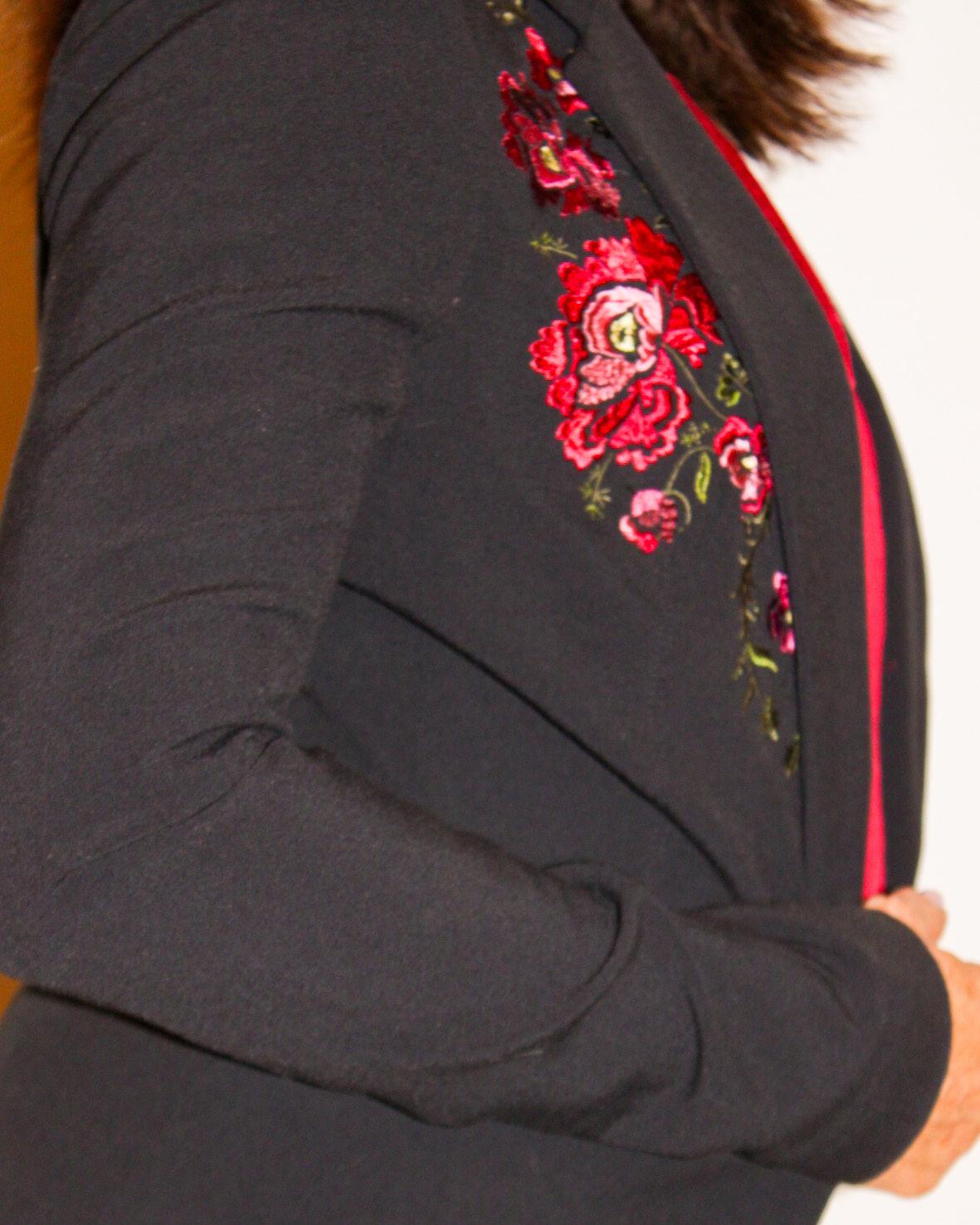
PANTHER
V 66|N5 Miami Palmetto Senior High School 7341 SW 120 St, Pinecrest, FL 33156 Wednesday March 20 2024
the



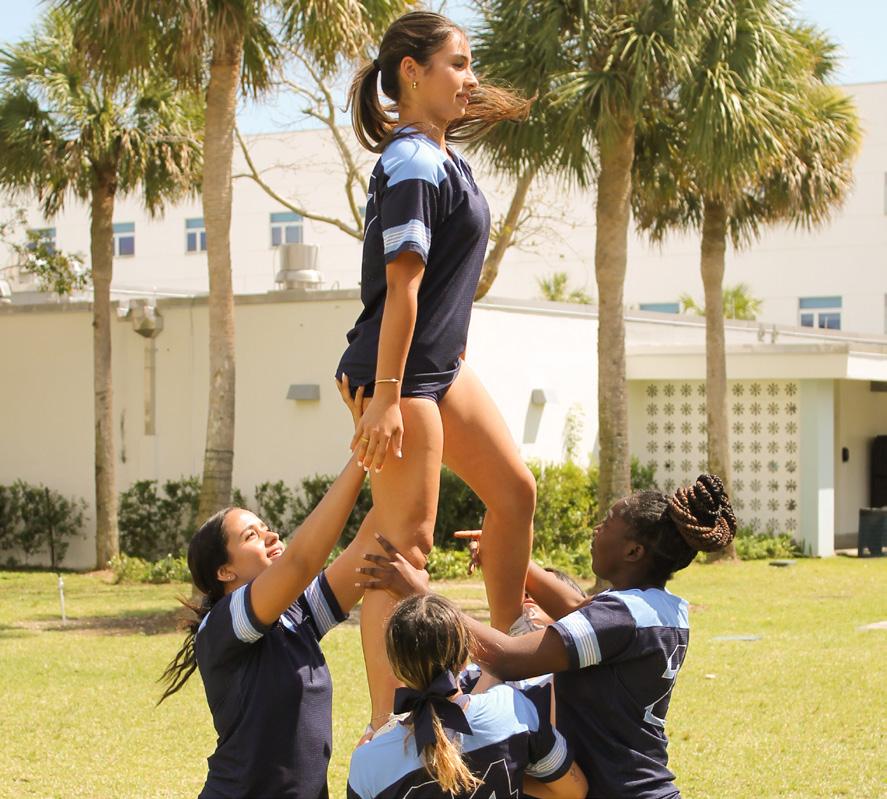


As new corporate opportunities arise all around the world, women undoubtedly continue to make a name for themselves in male-dominat ed industries, despite obstacles and hardships of all kinds.
Miami Palmetto Senior High announced a required financial literacy class, affecting every member of the class of 2027.
taking a tumble: cheerleading safety 10
According to USA Cheer, from 2014-2020, cheerleading ac cidents accounted for 14.3% of all catastrophic female high school and college injuries. As a result, cheerleaders across the country have taken precautions to increase safety within practices and performing.

www.thepalmettopanther.com @thepantherpaper @thepantherpaper
Freshly 18 years old and anxious to gamble, Miami Palmetto Senior High’s seniors, primarily boys, have created makeshift casinos in their homes and a new environment to bond.
When it comes down to student leaders, whether it be student government or club leadership boards, students expect those who can fulfill the attributes that define a leader.
P the march2024
the rise of female leaders 07
florida's new personal finance course 03
NEWS LIFE sports
student elections are a popularity contest 12 THE RISE OF POKER AT MPSH 04 FEATURE
OPINION

Florida’s 2024-2025 New PersoNal FiNaNce course
Miami Palmetto Senior High recently made an announcement that affects every single member of the class of 2027: a required financial literacy class. This class, officially called “Personal Financial Literacy Honors,” is a semester course that will be paired with “Student Life Skills,” a dual enrollment credit.
Under this requirement, all sophomores starting in the 2024-2025 school year must take one halfcredit of instruction in personal financial literacy and money management. In addition, students will be required to have seven-and-a-half, rather than eight, elective credits.
“The overview and purpose of this class is to make sure that by the time students graduate from high school, they have a much better understanding of their financial needs. This means how to open up bank accounts, how to save money, what interest rates are, how credit cards work — all the basic things that nobody really tells you,” Principal Victoria Dobbs said.
According to the act, this class must include instruction on types of bank accounts, loan applications, tax assessments, contracts and the basic principles of insurance policies among other financial lessons deemed necessary.
While no teacher has been confirmed for the class as of March, those eligible to teach the finance course must be certified in math, business or social science. With this new update to the Florida Department of Education, other new changes have also been implemented to the amount of elective credits these students need to graduate.
“So each year, as ninth graders come in, [the Florida Education System can make a schedule change]. Like before, you needed one credit that was an online class. Now, that’s not a requirement anymore for kids who are coming in,” Dobbs said.
Similar to the way AP U.S. Government and AP Macroeconomics are taught at MPSH, the class will be taught in two half-semester courses in which some students will be taking the financial course, while others are taking the dual enrollment credit in
one semester.
“It’s a semester course, so we’re going to pair it up with the SLS, the dual enrollment course … more than likely we will have one teacher who will teach all the sections of the financial literacy class and then one teacher who will teach SLS,” Dobbs said.
While this class seems to be an exciting addition for the administration, some students who will take the class next year find it limiting to their elective choices.
For freshman Sofia Cohn, this required course has altered her intended schedule for her sophomore year. While she originally planned on taking AP Art History, the new requirement takes this away. Although Cohn finds the class limiting on her schedule, in the future she thinks she will learn to value the course.
“I think eventually I’ll end up appreciating [financial literacy class] because I won’t go out into the real world knowing nothing,” Cohn said.
On the other hand, in terms of teacher concerns, AP Environmental Science teacher Pamela Shlachtman worries about her class and the number of students who will choose to enroll in it, specifically those in the AP Capstone Program who already have the preset elective of AP Seminar.
“Whenever there are added required classes I think it always hurts elective classes. And if there are more added classes in 10th grade I think it can very well limit other elective classes, Shlachtman said.
While as of right now the Financial Literacy Course only affects the Class of 2027, this information is subject to change.
NEWS | 03
Brooke Wilensky Opinion Editor b.wilensky.thepanther@gmail.com Ava Stuzin News Editor a.stuzin.thepanther@gmail.com DESIGN BY SAVANNA BYLES
BY ELLA
PHOTO
WEHMEYER
May the Best Hand Win: The Rise of Poker at Palmetto May the Best Hand Win: The Rise of Poker at Palmetto
The lights are dim and the stress is high while the table tries to analyze the smirk on each other’s faces with a set of cards in hand. Whether dressed in black suits or pajamas sitting in the dining room of a family home, teenagers’ new favorite activity goes down: a good old game of poker. Freshly 18 years old and anxious to gamble, Miami Palmetto Senior High’s seniors, primarily boys, have created makeshift casinos in their homes and a new environment to bond and have fun.
Due to the casino’s legal ages often being 21 and above, the following poker-invested boys have found ways to play their beloved game legally. They manage to find time throughout their days to squeeze in a casual game of poker and share a laugh.
“ ... Our friend has a poker set in his car at all times, and if we’re at any of our houses, sometimes we play there,” senior Diego Ortiz said.
The most commonly played version of poker is “No Limit Texas Hold ‘Em.” Typically, in this version of poker, the players at the table have to put in a small bet just to join in — these are called the “big blind” and the “little blind.” Each player is dealt two cards face down. These are called the “Hole cards,” which help decide the strength of
the hand to determine whether the player wants to continue with the game. A round of betting occurs, then three community cards are dealt face-up with a round of betting between each and concluded with a final round of betting. These seven cards are used to make the best fivecard poker hand. Whoever has the best hand by the end of the game wins the pot.
With the shuffling of the cards, the clinking of the chips and the occasional scream or laugh filling the echoing room, a group of young adults forge ever-lasting memories and friendships.
“The primary goal is definitely just to hang out with our friends and spend time together. The money is just a little additional bonus to it,” senior Joshua Siegal said.
While the recreational game is all for enjoyment and leisure, the atmosphere can easily become tense and competitive, with players often getting riled up as the stakes heighten.
“[Some friends] throw stuff and then others are very calm going into it and they like to focus on the actual game rather than trying to be the best at it. Some kids refuse to pay [the final payout] and then it turns into long-term grudges,” Ortiz said.
With convincing bluff, manipulation and a great poker




04 | LIFE
face, winning the game may come easily and can result in taking home everyone’s contributions from the night.
“I also like the euphoria when the cards get revealed and you have the best hand on the table and you take all the chips in the middle. I think it’s a lot like I played for the big moment. I think [poker is] super fun,” senior William Odgen said.
The ultimate goal, a royal flush, is the best hand one can get. It consists of cards of the same suit that are also all royal: King, Queen, Joker and an Ace.
“If you get a royal flush, then you take everyone’s winnings from the table; it’s basically the best hand that you can get, super improbable. It’s only happened one time in our friend group, but I think they walked away with 200 bucks from everyone’s pot,” Ortiz said.
These young adults gather around the table on a casual weekend to play poker as a distraction from all other stresses brought up by senior year. Poker occupies their concentration, with their only worry being the game.
While the game itself is enjoyable, senior David Krawczyk believes playing with his closest friends is truly what makes the game whole. Competing with your friends heightens the rush of the game.
“I like sitting down at the poker table with my friends more than playing poker at the casino. Bluffing or outplaying someone brings a better rush to the game,” Krawczyk said.
While the pressure builds with high stakes and the possibility of taking home money, the environment can become exciting and stressful, despite many enjoying the simple nature of the game. Some may wonder, if there is no money on the table, is the game even all that fun? According to these young poker enthusiasts, sometimes playing without money can be even better.
“[My favorite experience playing poker] was definitely one day that we actually weren’t playing with money. We were playing with a punishment and whoever [lost] had to jump into one of our friend’s lakes and backflip into it, and [my good friend] was actually the person that lost that day, so that was pretty funny,” Ortiz said.
Mia Shields Design Editor m.shields.thepanther@gmail.com
Alexis James Multimedia Photo Editor a.james.thepanther@gmail.com



LIFE | 05
DESIGN BY LUNA GARCIA PHOTO BY JAKE HAWKINS
PANTHERthe

STAFFER OF the month
MARCH COLUMN
CLEAN, PAMPER, REPEAT...THE CARE AND KEEPING OF YOUR FROZEN EMBRYO
Thanks to an inventive new ruling by the likes of the Alabama Supreme Court on Feb. 16 frozen embryos, created during vitro fertilization treatments, are now considered children. These unborn children have been given the same legal protections as any breathing specimen under the age of 18.
With that said, women around the U.S. should preemptively learn how to properly care for an embryo as preparation in case it becomes necessary, and maybe even consider signing up for an Early Childhood Education class for more information.
Daytime Care:
If not signing your straw-like container of eggs, cryopreserved in liquid nitrogen at negative 196 degrees Celsius, up for a “Mommy and Me” class at your local community center for some extra social time — if presented with the opportunity outside of work or school — definitely consider taking your courier of frozen embryo to the park for some sunshine and outdoor time. Be careful! We would not want the baby to get too much heat exposure and risk the unfortunate demise of your de-uterified egg.
Mealtimes and Temperature Maintenance:
During your daily breakfast, lunch and dinner times, pull a high chair up to the dinner table for your frozen eggs to help socialize them and give them a sense of what meals will be like once they grow up. Also, make sure to tuck the small tube of your baby embryo in the freezer with a packet of dry ice at nighttime to ensure they have proper freezing time and can feel energized in the morning.
Adolescence:
The teenage years are tough. Especially when puberty starts and your frozen embryo’s temperatures start to fluctuate more and more, it is extra important to provide them with your support and guidance during the hard times. They need it. Spending all that time in the confines of your womb might have left tough marks that need working out. Consider a therapist or guidance counselor, you can both get through this.
sofia copy editorEleanor Harris Copy Editor
THE RISE OF LEADERS: FEMALE BRINGING WOMEN TO THE TABLE. FEMALE

“We have made so many advances through the years but it wasn’t that long ago, when I came into the workforce women were not still allowed to apply for a credit card without having a man sign. Wow, that was 1974. That wasn’t that long ago. So these have been hard-earned victories of equality in respect and we need to make sure that we don’t go backward,” Baptist Health South Florida CEO of Fundraising Alex Villoch Villoch said. This Women’s History Month, The Panther highlights different women in the business industry, striving to raise the bar and leave past obstacles behind.
FEATURE | 07
THE
RISE
OF FEMALE LEADERS: THE RISE OF FEMALE LEADERS: Bringing Women to the Table

As early as the 19th century Women’s Rights Movement and the Seneca Falls Convention of 1848 to the 21st century, females have been working their way up to new leadership positions. As new corporate opportunities arise all around the world, women undoubtedly continue to make a name for themselves in male-dominated industries, despite obstacles and hardships of all kinds.
Former Chief Executive Officer of Vaya Health Michelle Cuccia has first-hand experience after beginning her career as a biochemist and later redirecting her path to working up the corporate ladder.
“I [witnessed] a lot of my male peers that started out with me, and they grew much faster than me, precisely because they could take on even more challenges than the ones I took, like moving to a different country, maybe every two or three years … I had to kind of stay in one place and continue to grow in that environment. But again, it was a personal decision. It wasn’t because I didn’t think I had what it took or because nobody gave me the opportunity,” Cuccia said.
Once entering the corporate world, Cuccia integrated herself into the professional environment, networking to build greater knowledge of marketing and sales. However, this provided a clear contrast from the previously femaledominated work field she was accustomed to.
“It seems like there’s a lot of middle management that are women in healthcare in general, but as you continue to go up, there’s less and less women in those leadership roles. So having achieved that role within the healthcare industry is also a way of breaking boundaries,” Cuccia said.
Cuccia spent 18 years developing a foundation for herself within corporate healthcare before becoming the Chief Executive Officer of startup company Vaya Health.
“I was like, ‘Wow, they’re losing a lot of money. I really have a huge responsibility and a huge challenge.’ But like I said, when I was interviewing for this job, I remember thinking, ‘I think I have the know-how to help this company’ … So it was very common sense to me how to bring that
company from losing money to making money. I can tell you, spoiler alert, that after two years of being the CEO of Vaya Health, we in fact did bring it, not only to break even, but we brought it to make money,” Cuccia said.
For Cuccia and many others, a change in mindset brings about a lifestyle change. For CEO and founder of The Children’s Voice Chorus Jamie Sutta, she attributes her accomplishments to her ever-growing passion for music and desire to fill the needs of the youth in the community.
“My first piece of advice is look at your inner world, what is happening there and work on that. Always strive to be growing, to be learning about who you are, and of course, the things that you’re working on. Number one, I’m a lover of learning and to me that’s what life is about. We’re here, we’re experiencing all of these things and we’re meant to learn about them and learn through them, so always keep growing in your knowledge,” Sutta said.
Sutta founded the CVC as a means to not only develop her experience in music but also to fulfill her desire to teach.
“I always felt like it was in my life’s purpose to give back what was given to me as a young person. I know how important music is and how powerful it can be, to be a place where a lot of really positive things happen either on an individual level or on a collective level,” Sutta said. “So when I look back at my music education and experience, it has not only empowered me with skills and confidence but the ability to know that there was something that I had to offer to the world that was uniquely mine and that no one else could offer.”
Baptist Health South Florida CEO of Fundraising Alex Villoch has spent her career demonstrating her prevalent leadership qualities through numerous roles. Along with being the first female publisher in the 115-year history of the Miami Herald newspaper, Villoch also succeeded in obtaining other executive positions through her strong mentality that confidence is the key to success in the ever-changing world.
“Somebody taught me this a long time ago. They said
08 | FEATURE

whether it’s for your personal relationships or your business, know what your non-negotiables are. ‘What’s your True North?’ For me, I have to work for a company that shares my same values, that I know works from a place of integrity and honesty. I learned that I needed to work for somebody I didn’t necessarily like to have as my boss, but I needed to respect them intellectually. I needed to work for a company that did good in the community one way or another … My mother always taught me you have to give back,” Villoch said.
While not feeling that gender inequality is as evident in the insurance world, Eastern United Insurance co-CEO Jackie Ordonez believes that self-assurance is the solution to advancing in business.
“Be confident. Educate yourself. Don’t be afraid to make phone calls. Seek out every possible resource. I would say, always say yes. If someone says ‘Oh, can you do this?’ Say yes. Figure it out after the fact, don’t back away from the challenge. There’s always a way. There’s so many resources available to young ladies nowadays, via the Internet and all of these different programs that now promote equality in the work world, that you’re going to be able to find those answers. Don’t back away from it,” Ordonez said.
Even in today’s world, just as the women of the past fought for equality, women of today continue to pave the way to be remembered in the history book as hard-working individuals who embrace a variety of roles. These leaders mentioned are just a tiny glimpse of the millions that help make room for women at the corporate table, allowing their voices to be heard and considered.
Aayana Baid Copy Editor a.baid.thepanther@gmail.com DESIGN BY ISABELLA LAGARTO PHOTOS BY EMILIA HAUS Gabriella Alvarez Life Editor g.alvarez.thepanther@gmail.com
FEATURE | 09
TAKING A TUMBLE: The Importance of Cheer Safety
According to USA Cheer, from 2014-2020, cheerleading accidents accounted for 14.3% of all catastrophic female high school and college injuries. As a result, cheerleaders across the country have taken precautions to increase safety within practices and performing.
At Miami Palmetto Senior High, cheerleaders understand and witness the risks involved with the sport
tricks to look good and be safe.
“Everybody has to be focused and do their part, because if not, someone could get hurt. So if everybody does what they’re supposed to do then [the stunt is] good,” Lopez said.
Head Cheer Coach Nina Pozo has taught cheer for years, making her no stranger to the risks of stunting. To avoid injuries on her team, Pozo carefully instructs the cheerleaders and makes sure everyone fully understands the steps and is completely comfortable.
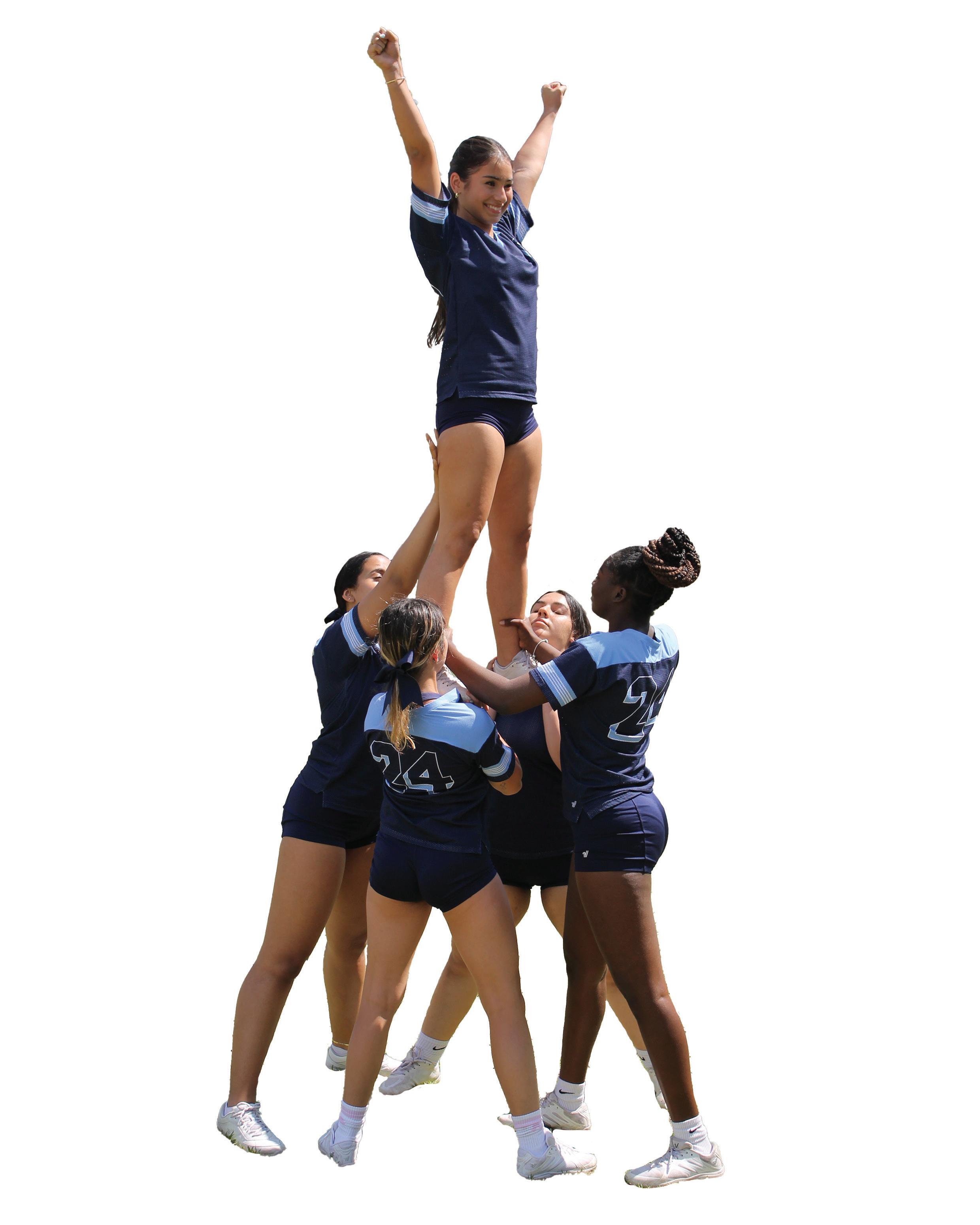
“When trying a new skill, we do something we call a safety circle. And with a safety circle, we do one, what we call subgroup, it’s each group that’s putting up a flyer or a person just going up in the air and we circle around the rest of the team around them until I feel that it’s safe for them to do it on their own,” Pozo said.
Cheer safety goes beyond physical preparation and constant practices: it also relies heavily on their mentality; cheerleaders have to be mentally strong and ready to take new risks. This demonstrates a unique durability that makes the injuries less likely to have long-lasting effects.
“You’re always gonna fall in life, no matter what it is that you’re doing, it’s learning from it. Same thing goes for cheerleading physically and mentally: You might fall but it’s how you come back from it,” Pozo said
Madeline Volpe Video Editor m.volpe.thepanther@gmail.com

10 | SPORTS
DESIGN BY MIA SHIELDS
PHOTO BY WILLIAM ALBURY
Emilia Haus Senior Multimedia Editor e.haus.thepanther@gmail.com
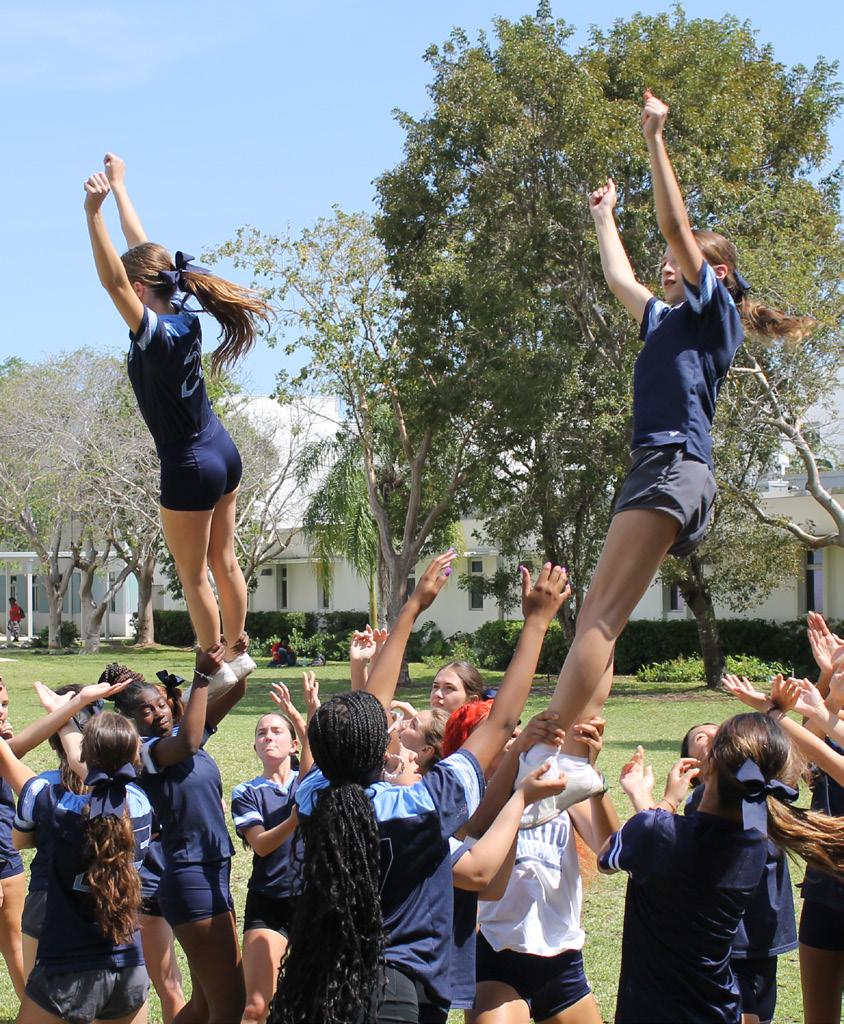
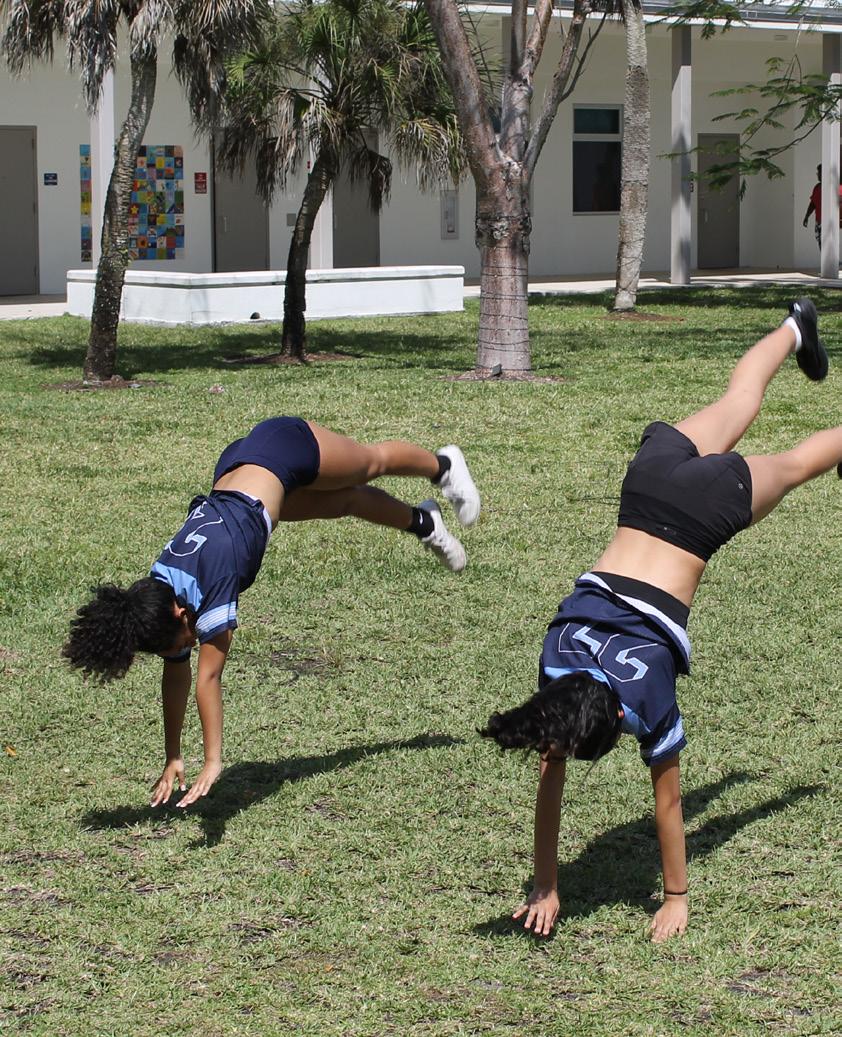
2022
Emergency Visits for Females
Ages 12-18
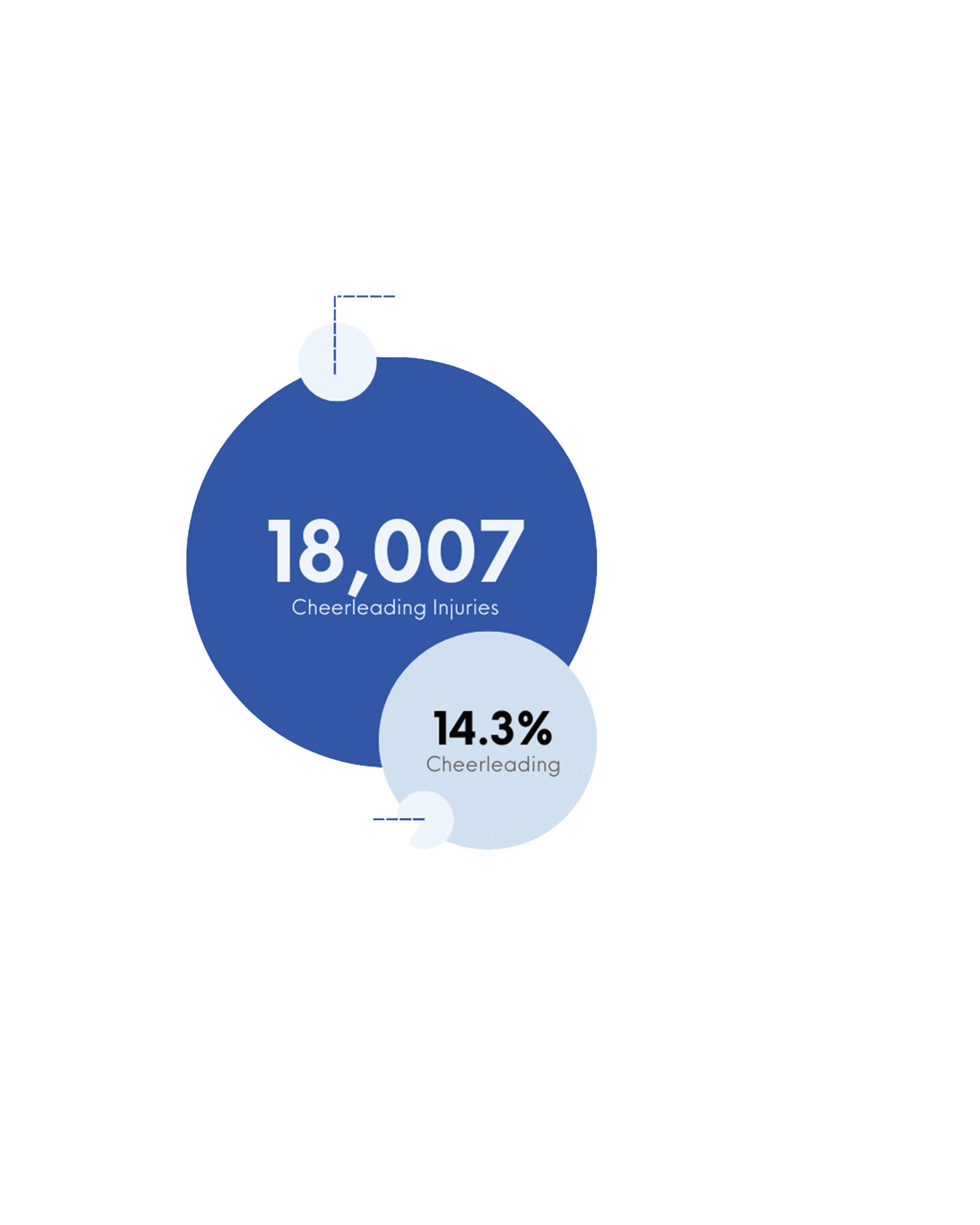

2014-2020
Female High Schools & College
Direct Catastrophe Injuries

usacheer.org
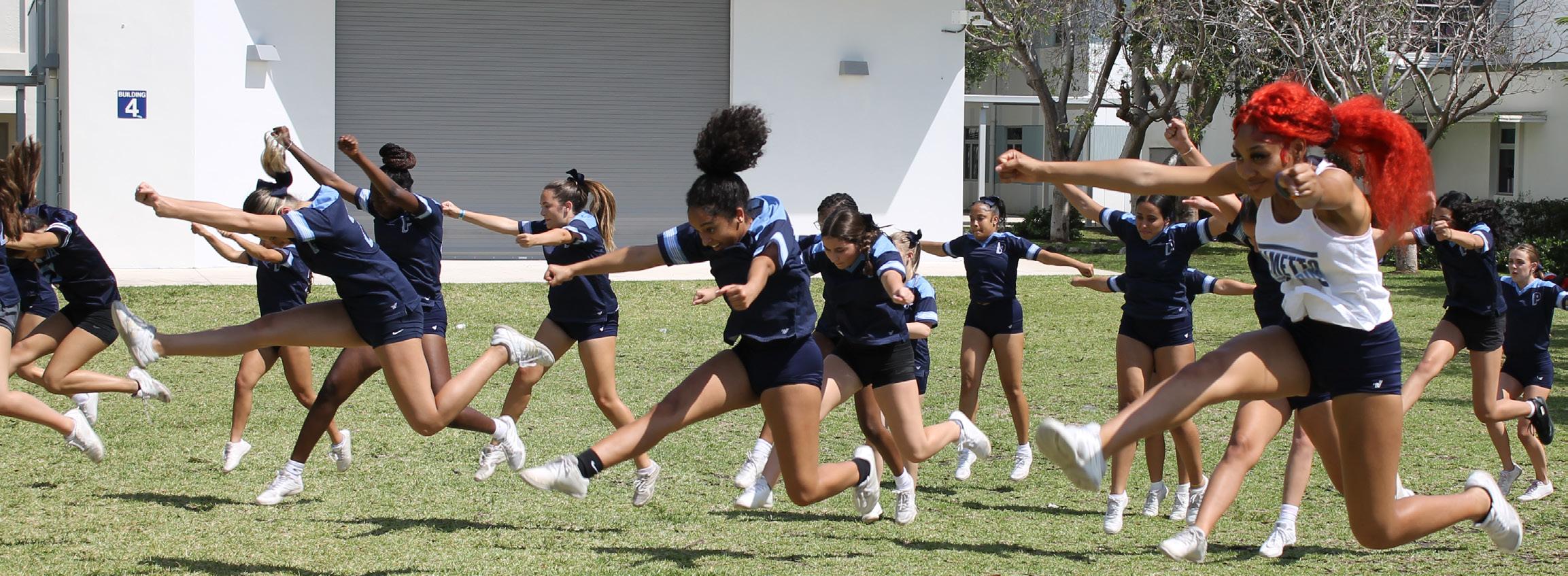

Student Elections are Nothing More Than a Popularity Contest
When one thinks of a leader, one would expect a highly qualified candidate with all the necessary qualities of someone who has the people’s best interests in mind. When it comes down to student leaders, whether it be student government or club leadership boards, students expect those who can fulfill the attributes that define a leader. However, this can not be fully applied under a flawed voting system in which students do not vote based on who might be the best leader, but rather, the most well-known.
When I am met with a ballot for a student board election, I find myself in the position of only knowing a select amount of the people on the ballot and, despite my better judgment, vote for the person I know most, or the one who had the funniest or most striking, colorful campaign sign or even gave out the best candy — not the one who might be the most qualified. This poses an obvious issue, as these decisions affect a whole student body.
This is not to say the one who gets voted is automatically less qualified because of their popularity — the idea of voting for the most familiar name only emphasizes a larger factor in choosing popularity over credibility: a lack of information on the students they are voting for.
students and student ballots are sent out, through email, public announcements, as well as in-person campaigning in classrooms.
Especially when it comes to student clubs, there are methods of voting that can help eliminate voting based on student popularity. For instance, club sponsors and current club members can review student applications and make a decision on new club leaders. This way, voting based on factors like high school popularity is minimized, and this can better guarantee that the next set of leaders are truly passionate about their positions.
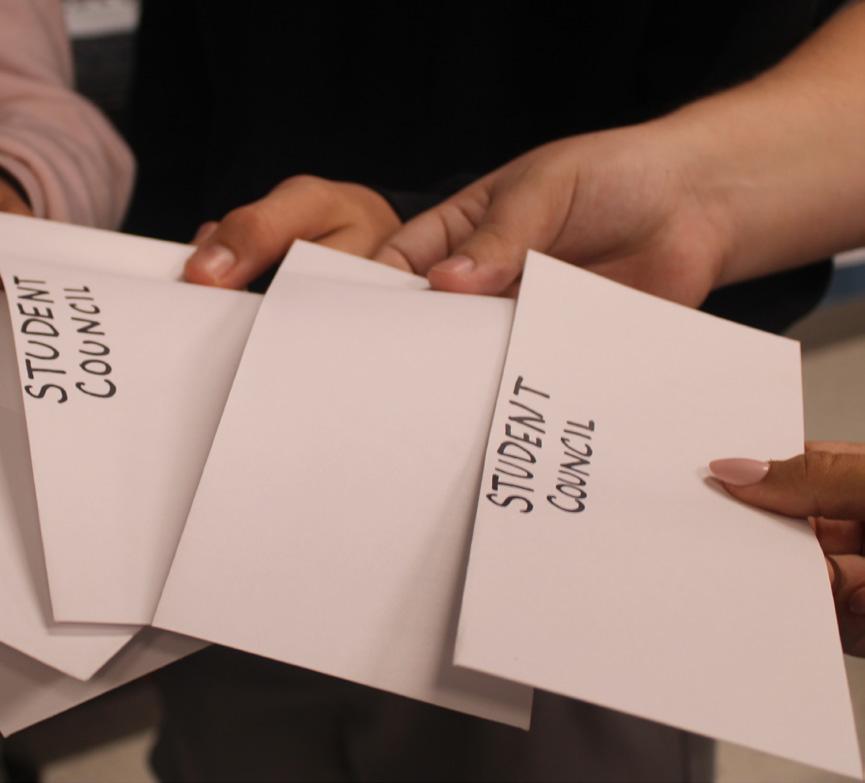
Before the ballot gets to students, some candidates may make promises to the student body. However, these promises are usually limited to two sentences in an Instagram post, perhaps a shoutout on the morning announcements or a TikTok or Instagram video. However, if a teacher does not put on the morning announcements, or a student does not have social media, where does that leave students to know who they are voting for? Unfortunately, student campaigns simply do not reach enough student attention for this exact reason. Because not all students have access to these resources, it makes it extremely difficult to reach the student body as a whole. Especially when there are easier solutions such as promoting student candidates the same way that voting for
However, sometimes student elections truthfully chalk up to just voting for popularity, despite information being properly distributed to students. ‘It’s not about what you know, but who you know,’ is a hard fact of modern life, even applying to student elections.
In this case, it is highly important that students recognize what they are truly voting for. Remember that you are not just voting for a friend or a classmate who sits next to you in your thirdperiod class — you are voting for people who are going to represent you until your graduation. You are voting for students who set up your fundraising, your student events and who represent your voice. Therefore, it is vitally important that students know who they are voting for and to learn how to separate those who may be running for reputation and an extra bullet point on their college resume, versus someone who wants to make a genuine difference in their school. It is also equally important for those who are running to bring out their voices as much as possible and to stand out from the rest in a sea of candidates. If you have a great idea, stand up for it — make your voice count, Panthers.
Nicole Martin
Contents Editor n.martin.thepanther@gmail.com DESIGN BY LUNA GARCIA PHOTOS BY ALEXIS JAMES 12 | OPINION
Special Thanks To Our Donors!
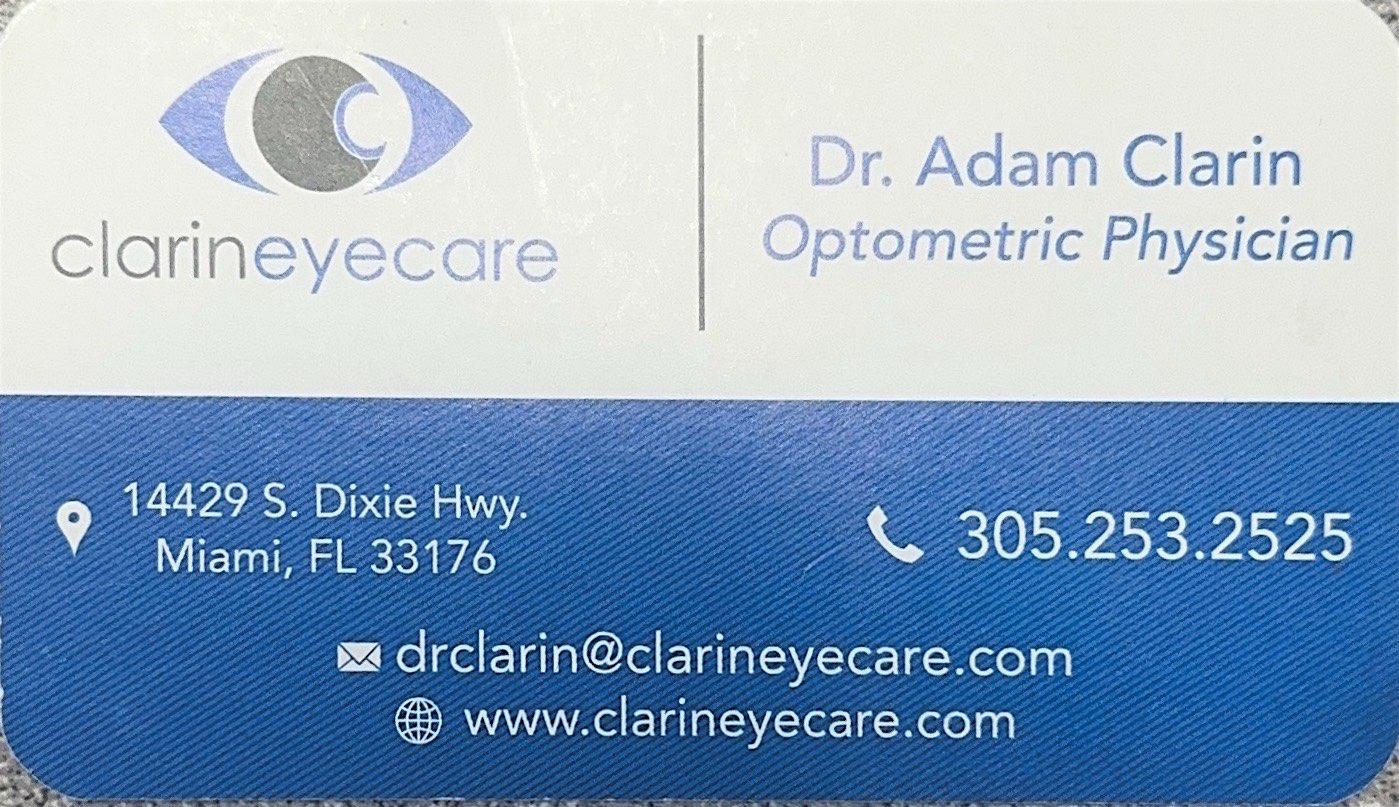 Ana Harris
Barry Levitt
Matt Volpe
Chelsea Wilkerson
Helen Garcia
Ana Harris
Barry Levitt
Matt Volpe
Chelsea Wilkerson
Helen Garcia
ADS | 13
Carolina Duran
PANTHER the
STAFF EDITORIAL
High school students around the country dream of the freedom of living the college life, but for women, the fear of living alone on a huge campus grows more as each day passes.
Senior
Senior
Many universities have not spoken out about these issues however, the University of Kentucky conducted a research study to see what could be done on their campus to make women feel safer and found policy changes and physical safety on campus is what needed to be changed.
According to the National Sexual Violence Center, one in five women experience sexual assault on college campuses, while only one in 16 men experience assault on campus. Either way, the number should not matter; whether it is one in five or one in 100, sexual assault, especially on a college campus, poses a larger issue.
Female endangerment has become of great importance, especially in the last couple of years following attacks on college campuses such as in the case of Laken Riley, a student who was killed in broad daylight while jogging on the University of Georgia campus and University of Iowa student Mollie Tibbetts, who was killed while also jogging through campus.
A college campus is supposed to be a place for students to feel safe, but many women feel the complete opposite. Researchers at the University of Kentucky found that women claimed to feel unsafe in specific places on their campuses, especially in dark and empty areas.
These changes are what lead women’s safety in the right direction and can make college campuses seem like an exciting environment for women.

our app!
Editor-In-Chief
download
STAFF Print
Isabella Hewitt
Brooke Wilensky
Editor-In-Chief
Online
Editor
Sofia Strohmeier Managing
Ava Garcia
Copy Editor
Sara Paredes
Editor
Senior Multimedia
Emilia Haus
Design Editor
Manager
Isabella Lagarto Business
Feature Editor
Jasmine Judge
Editor
News Editor
Life Editor
Daniel Perodin Contents
Nicole Martin
Ava Stuzin
Editor
Gabriella Alvarez Sports
Editor
Edie Carneiro Opinion
Multimedia Team
William Albury
Seth Clarin
Ella Wehmeyer Design Team
Luna Garcia
Savanna Byles
Mia Shields Copy Team
Anna Levitt
Aayana Baid
Eleanor Harris
Writer
Sophia Snyder Staff
Justin Fechter
Paulina Handal Adviser
Laura Aviles Editor-In-Chief
Amy-Grace Shapiro
Jake Hawkins
Editor
Alexis James Video
Madeline Volpe
Lilianne Fernandez
MISSON STATEMENT
The Panther staff aims to inform fellow students and parents about school-wide, local, national, and international news. The Panther’s content aims to represent the student body. Editorials feature the opinions of staffers. Features of other students, teachers and clubs further promote the spirit, culture and personality of Miami Palmetto Senior High School.
EDITORIAL POLICY
The Panther is a monthly publication of Miami Palmetto Senior High located at 7431 SW 120th Street Miami, FL 33156, (305) 235-1360 ext. 1124. The views expressed are solely those of The Panther staff. Students who wish to respond to an article in this publication or discuss another issue may write letters to the editor and submit them to room 1124 or e-mail us at a.shapiro. thepanther@gmail.com. The Panther has professional membership in NSPA and CSPA. The Panther prints 1,100 copies per issue for distribution. The Panther is distributed for free to all students in school. Please visit our paper online at thepalmettopanther.com.
BYLINE POLICY:
All creative work (such as illustrations, graphics, photos and writing) excluding staff editorials and staff member pictures will include byline credits.
ADVERTISING POLICY:
Ads will be designed by the advertiser and include all information the advertiser wants included. If the advertiser asks the staff to design the ad, the individual who sold the ad will design the ad or the Ads Manager will. Ads will be approved by EICs, the Adviser and the Ads Manager. If an ad produced is illegible, contains false information, or the advertiser does not like it, they will receive a free ad in the next issue. If you would like to advertise, please contact us.
The School Board shall comply with all Federal Laws and regulations prohibiting discrimination and all requirements and regulations of the U.S. Department of Education. The Board will enforce its prohibition against discrimination/harassment based on sex, race, color, ethnic, or national origin, religion, marital status, disability, age, political beliefs, sexual orientation, gender, gender identification, social and family background, linguistic preference, pregnancy and any other basis prohibited by law. The Board shall maintain an educational and work environment free from all forms of discrimination/harassment, which includes Title IX of the Education Amendments of 1972. Title IX prohibits sexual harassment and other sexual misconduct such as unwelcome touching, graphic verbal comments, sexual jokes, slurs, gestures or pictures. All students, administrators, teachers, staff, and all other school personnel share responsibility for avoiding, discouraging, and reporting any form of prohibited discrimination or harassment against students by employees, other students and their parents or guardians, or third parties. This policy prohibits discrimination and harassment at all School District operations, programs, and activities on school property, or at another location if it occurs during an activity sponsored by the Board.
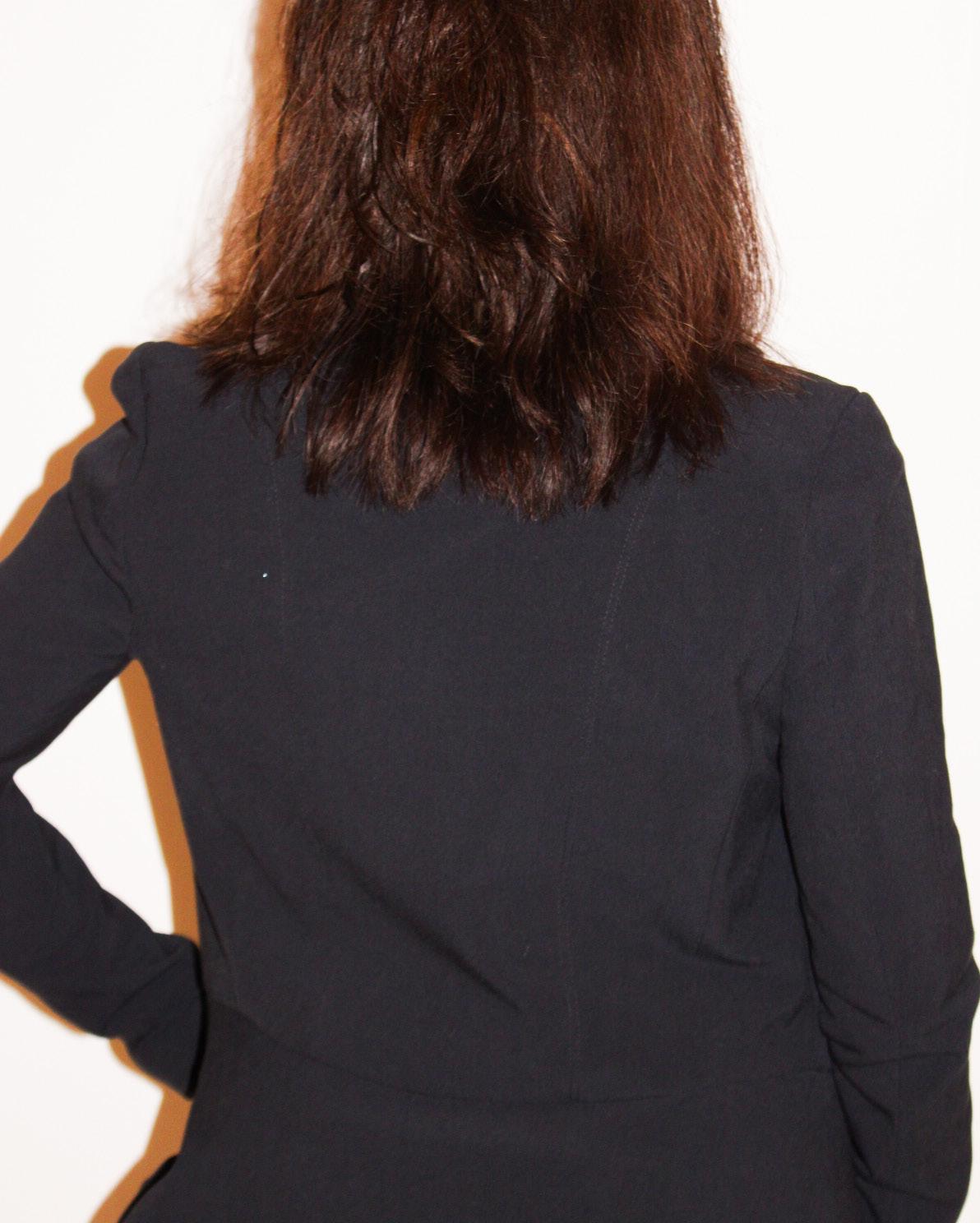






























 Ana Harris
Barry Levitt
Matt Volpe
Chelsea Wilkerson
Helen Garcia
Ana Harris
Barry Levitt
Matt Volpe
Chelsea Wilkerson
Helen Garcia

